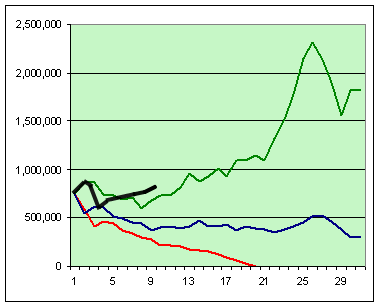Maybe I'm being too simplistic but I think this is sort of making a huge assumption and then is sort of missing the point of the graphs. ...
If it makes it easier, just assume that each one of them came into their money only in the year that each of them retired.
I'd say that rather than 'missing the point', I'm trying to make an additional point to put it in some perspective. And if you assume each one of them came into their money only in the year that each of them retired, then that is exactly what the graphs show. And as you point out, that happens for some (should we do a poll to see if we have any bank robbers? - I almost missed that one

).
My point is, that many (probably most?) of us built up a nest egg over many years. If you look at that graph as three individuals, with everything equal other than the year they retire (equal career income, equal amount saved, equal spending requirements, etc), and all three had a $750,000 portfolio in 1973, then my analysis (I think), makes sense. That $750,000 portfolio dwindled by 1975, and that guy that didn't retire in 1973 didn't dodge a bullet by retiring in a relatively safer 1975, he's going to be affected by starting retirement with a smaller portfolio, that was hit by the 1973-74 downturn.
I think the point in that graph is that there are a lot of points of view.

Probably the intention in the FIRECalc introduction was indeed to show that different starting years produce different outcomes. However, there are other points to make about "when should I retire and how much do I need?". We all need to get our 2 cents in on this.

Good point. I think the relevance depends on the question.
1) Would a person who hit 62 in 1973 help or hurt himself by waiting 2 years to retire? How much?
2) Were people born in 1913, who retired at 62 in 1975, a lot luckier than those who were born in 1911 and retired in 1973?
3) I have $750k and I'd like to retire today. Can I retire with an initial [$60k; $45K; $30k; $15k] withdrawal, adjust it annually for inflation, and expect my money to last longer than I do?
I think FireCalc is designed to answer question 3, and it does a reasonably good job.
I've seen people use results like FireCalc's to make claims about question 2, that I don't think are valid. The problem is the one you've identified, FireCalc does not look at before retirement returns.
Similarly, question 1 requires more than FireCalc for a meaningful answer.
I agree. Well said.
A parallel to this, that always bugs me, is when a poster defends a large fixed income AA by pointing to a 40% drop in equities as 'proof' that equities are risky. That 40% drop is always measured from a peak. So again, unless you came upon a lump sum, and put it all in the market right at the peak, that 40% drop is not apples-apples to a fixed investment.
The fixed investment
didn't have a big peak to fall from. It makes more sense to compare the equity drop to the cost basis of investments made over a long period of time, which is probably what most of us have done. Viewed that way, a 40% 'drop' might not have been a drop at all.
-ERD50

